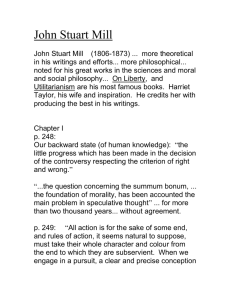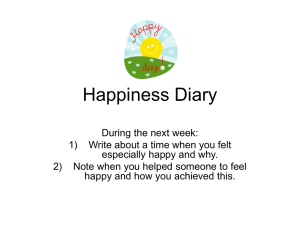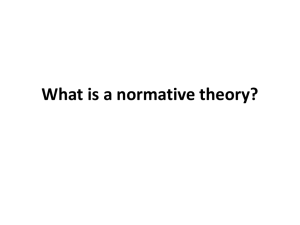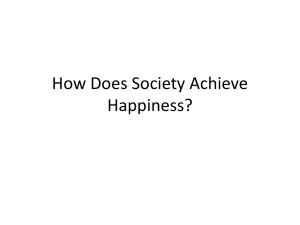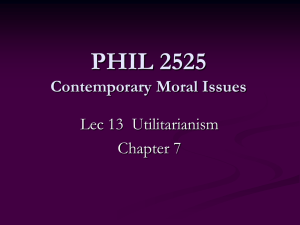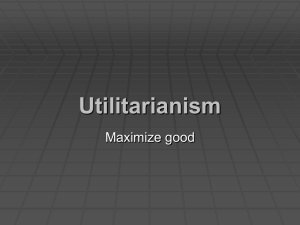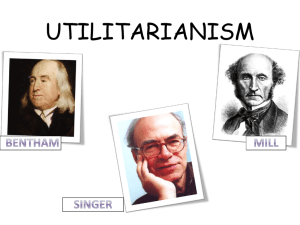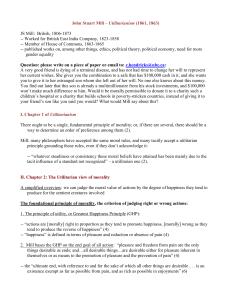File - Eric`s ePortfolio
advertisement
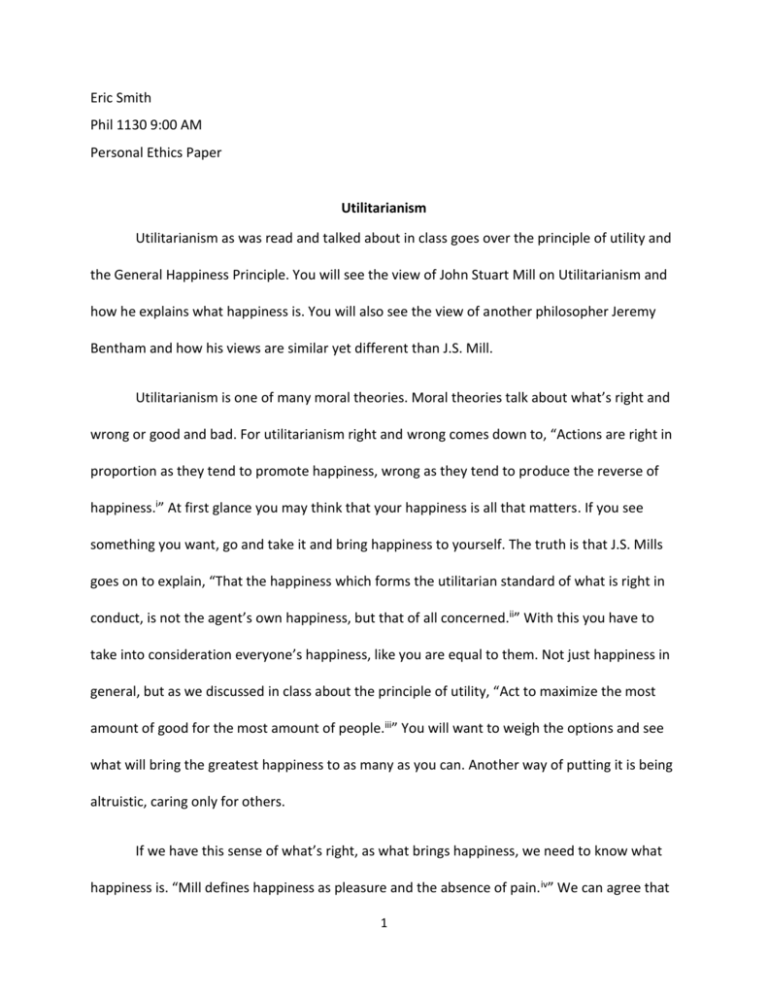
Eric Smith Phil 1130 9:00 AM Personal Ethics Paper Utilitarianism Utilitarianism as was read and talked about in class goes over the principle of utility and the General Happiness Principle. You will see the view of John Stuart Mill on Utilitarianism and how he explains what happiness is. You will also see the view of another philosopher Jeremy Bentham and how his views are similar yet different than J.S. Mill. Utilitarianism is one of many moral theories. Moral theories talk about what’s right and wrong or good and bad. For utilitarianism right and wrong comes down to, “Actions are right in proportion as they tend to promote happiness, wrong as they tend to produce the reverse of happiness.i” At first glance you may think that your happiness is all that matters. If you see something you want, go and take it and bring happiness to yourself. The truth is that J.S. Mills goes on to explain, “That the happiness which forms the utilitarian standard of what is right in conduct, is not the agent’s own happiness, but that of all concerned.ii” With this you have to take into consideration everyone’s happiness, like you are equal to them. Not just happiness in general, but as we discussed in class about the principle of utility, “Act to maximize the most amount of good for the most amount of people.iii” You will want to weigh the options and see what will bring the greatest happiness to as many as you can. Another way of putting it is being altruistic, caring only for others. If we have this sense of what’s right, as what brings happiness, we need to know what happiness is. “Mill defines happiness as pleasure and the absence of pain.iv” We can agree that 1 when not in pain we are more likely to be happy. Many things come to mind when thinking about pleasure. J.S. Mill states, “It is quite compatible with the principle of utility to recognize the fact, that some kinds of pleasure are more desirable and more valuable than others.v” Most people tend not to look beyond the surface of things, pleasure is pleasure. However, it seems that if you look more closely you would agree with J.S. Mill. “Few human creatures would consent to be changed into any of the lower animals, for a promise of the fullest allowance of a beast’s pleasures.vi” True there are more desirable pleasures people would have rather than any amount of the lower pleasures. One of J.S. Mill’s famous quotes are, “It is better to be a human being dissatisfied than a pig satisfied; better to be Socrates dissatisfied than a fool satisfied.vii” So even if you get higher or better quality pleasures every once in a while that would be better than having the lower pleasures all the time. Everyone is different, not everyone enjoys the same kinds of things. A pleasure to one may not be a pleasure to someone else. J.S. Mill says, “What means are there of determining which is the acutest of two pains, or the intensest of two pleasurable sensations, except the general suffrage of those who are familiar with both?viii” It seems like one of the best ways to find out some of the best pleasures is to have people voice their opinion. As people voice their opinion, you can get an idea of the general likes of the people. Again stating J.S. Mill, “As between his own happiness and that of others, utilitarianism requires him to be strictly impartial as a disinterested and benevolent spectator.ix” Affirming what was stated earlier that everyone is equal, no one person’s happiness is above that of another’s. It is all about the whole of all those involved. 2 Jeremy Bentham was an earlier philosopher of utilitarianism. He thinks, “Actions are approved when they are such as to promote happiness, or pleasure, and disapproved of when they have a tendency to cause unhappiness, or pain.x” The two philosophers shared their idea on what was considered good and bad. It seemed that they both knew that bringing happiness was to all sentient beings as Jeremy Bentham was one of the first to fight for animals rights. J.S. Mill states, “Secured to all mankind; and not to them only, but, so far as the nature of things admits, to the whole sentient creation…xi” Even though they both thought the most amount of good or pleasure for the most amount of people they had different views on pleasure. We saw that J.S. Mill had a sense of higher and lower pleasures. Pleasures that dealt with quality outweighing quantity, regardless of how much. Jeremy Bentham on the other hand, “treats all forms of happiness as equal.xii” With his famous quote, “Quantity of pleasure being equal, push-pin is as good as poetry.xiii” Jeremy Bentham is all about how much the pleasure gives you, the quantity not the quality. He came up with the Felicific Calculus, “an algorithm formulated by utilitarian philosopher Jeremy Bentham for calculating the degree or amount of pleasure that a specific action is likely to cause.xiv” The felicific calculus is, “divided into the categories of intensity, duration, certainty, proximity, productiveness, purity, and extent.xv” It seems that Jeremy Bentham’s theory would be the original theory and that J.S. Mill made some changes to it. Leaning toward Mill’s theory, it seems that a better quality of pleasure is enticing than any quantity of lower. In our day, (around 2006) a study was done that showed more women were going to school than men. It said that the men were staying home 3 and playing video games. This reminds me of what J.S. Mill said, “Men lose their high aspirations as they lose their intellectual tastes, because they have not time or opportunity for indulging them; and they addict themselves to inferior pleasures, not because they deliberately prefer them, but because they are either the only ones to which they have access, or the only ones which they are any longer capable of enjoying.xvi” Sure video games or just sitting around and not accomplishing anything can have some pleasure to it, but in the end it’s empty. While the girls go to school, though it’s hard work, they get a greater sense of pleasure from it. Seeking the higher pleasures in life and sharing them with others would be far more fulfilling. In class a lot of theories were discussed. At one point or another there seems to be flaws with them all. There is no one theory to have all the answers of morality. A brief look at utilitarianism has an appeal, most good most people. You try to help others out and act altruistic but at what length do you go? Is it worth it like in the story of, “The ones who walk away from Omelas” to have someone locked up? As you walk by, you think your life may not be that bad. There may be a better way. We should still continue to seek out to make others happy and in turn it may bring happiness to ourselves. i Vice & Virtue In Everyday Life pg211 Vice & Virtue In Everyday Life pg215 iii In class discussion iv Vice & Virtue In Everyday Life pg211 v Vice & Virtue In Everyday Life pg212 vi Vice & Virtue In Everyday Life Pg213 vii Vice & Virtue In Everyday Life pg213 viii Vice & Virtue In Everyday Life pg214 ix Vice & Virtue In Everyday Life pg215 x Stanford Encyclopedia of Philosophy- www.plato.stanford.edu/entries/utilitarianism-history xi Vice & Virtue In Everyday Life pg215 xii Wikipedia-www.wikipedia.org/wiki/John_Stuart_Mill xiii Wikipedia-www.wikipedia.org/wiki/John_Stuart_Mill xiv Wikipedia-www.wikipedia.org/wiki/Felicific_calculus ii 4 xv xvi Wikipedia-www.wikipedia.org/wiki/Jeremy_Bentham Vice & Virtue In Everyday Life pg214 5

